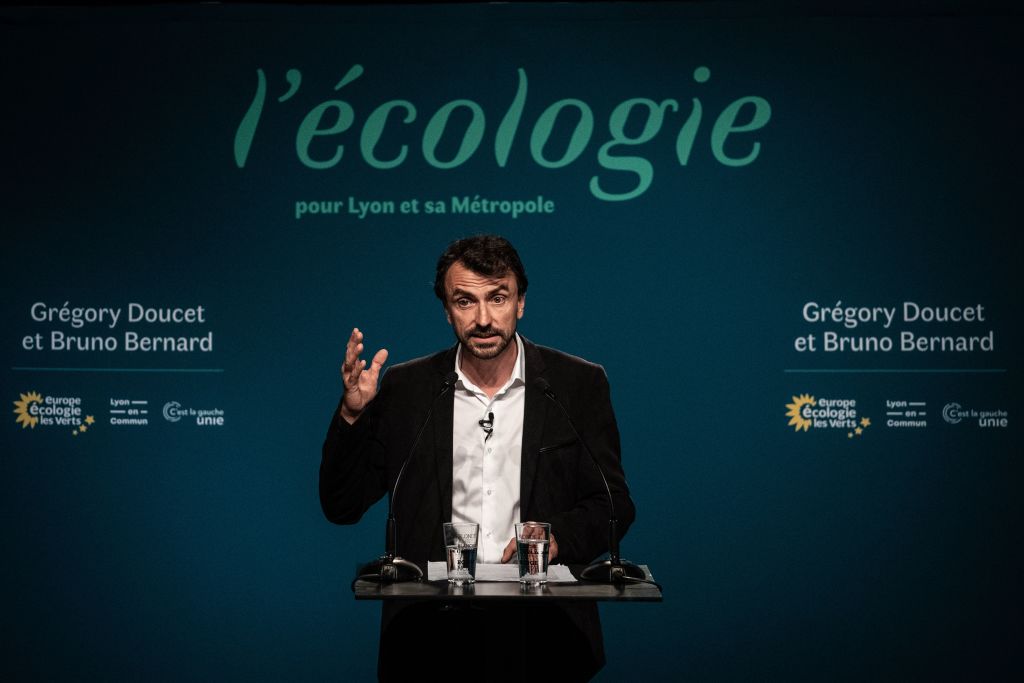On Sunday evening I met three left-leaning French friends for a picnic in a Parisian park. We’d hardly begun the pâté before they were arguing. One confessed that she hadn’t voted in the second round of the regional elections. The other two were aghast. Why hadn’t she done her duty as a good socialist? She had voted in the first round but she baulked at supporting a radical left-wing coalition comprising the socialists, the greens, the communists and the far-left France Insoumise.
As it turned out, her vote wouldn’t have made a difference. Valérie Pécresse, the incumbent center-right candidate was comfortably reelected in the Ile-de-France with 45.6 percent of the vote, 11 percent more than Julien Bayou, the Green candidate of the left-wing coalition.
All the same the coalition picked up a substantial number of votes, despite the growing extremism of some within the Green party. In the last year the Green Bordeaux mayor banned Christmas trees and the Lyon mayor damned the Tour de France as sexist and environmentally inappropriate. Only last week the Green mayor of the 12th arrondissement in Paris opposed a proposed statue to working-class rocker Johnny Hallyday because it included a Harley Davidson motorcycle, which is bad for the planet, even in sculpture.
It’s tempting to laugh at such student government-type nonsense but the threat that the Greens — who are essentially the far-left in corduroy and knitted sweaters — pose to the Republic should not be underestimated. These people have power.
In a radio interview last week the former Socialist prime minister, Manuel Valls, urged people not to vote for the left-wing coalition in the Ile-de-France. ‘If I’m frank,’ he said, ‘I would vote for Valérie Pécresse because I consider that there is a danger coming from those who turn their back on the Republic.’
Valls is right to be alarmed. As in America, much of the left in France has become radicalized, captured by those who despise their country’s culture and history. Its leaders are overwhelmingly from the bourgeoisie, university-educated and well-off and contemptuous of the working-class. It is instructive that of my three friends the one who refused to vote for the left-wing coalition is the one who is working-class and without a university education.
Many voters are environmentalist but are exasperated at the way in which the Greens have been hijacked by a younger generation of activists who are as much focused on identity politics as they are on climate change, who the French call the ‘Islamo-gauchistes’.
Earlier this year the Green-led city council of Strasbourg authorized the funding of €2.5 million ($2.97 million) for the construction of a mosque — the largest in Europe — by a Turkish association allegedly with links to Recip Tayyip Erdogan. Writing in Le Figaro Gilles Clavreul, a former inter-ministerial delegate against racism and anti-Semitism, said the decision ‘signals a rupture’ with Republican values, adding: ‘Up till now, Gregory Doucet’s (the mayor of Lyon) dubious outbursts against the Tour de France or his Bordeaux counterpart, Pierre Hurmic, who renounced the traditional Christmas tree, could have made you smile. With the Strasbourg decision… the Greens affirm a political choice with grave consequences.’
The results of the regional election have thrown the presidential race wide open. Just a few weeks ago everyone assumed it would be a rerun of the 2017 election between Emmanuel Macron and Marine Le Pen. But their parties fared badly in the regionals, giving a much-needed boost to the center-right Republicans and the disparate left-wing parties. Reports in the media suggesting that the president is ready to relaunch some of his social reforms, notably pushing back the age of retirement from 62 to 64, will further encourage the left. This is an issue around which they can rally support.
At this moment in time it’s hard to envisage a left-wing victory in 2022 because there does not appear to be one figure capable of uniting the various factions. But it’s not inconceivable that someone will emerge in the coming months and there have already been two meetings this year to explore such an alliance. Further discussions will surely be had in the coming weeks and the message on Monday from Olivier Faure, the secretary of the Socialist party, was upbeat, declaring that a coalition could ‘enable a victory’. Victory for the left in next year’s election would be a disaster culturally and economically for France.
You wonder how the military might respond to such a scenario. Unlike America, where identity politics is making alarming inroads into the ethos of the armed forces, the French military has not been infiltrated and there have been rumblings of discontent this year within their ranks over what they regard as the disintegration of law and order in the Republic and the rise of Islamic extremism.
Macron has been more pro-active than his predecessors in trying to combat these problems. If the military — and the police, who are also disaffected — are disgruntled with the current government, how would they feel serving a government run by radical environmentalists and Islamo-gauchistes? They, like Valls, would regard such a coalition as a ‘danger’ to France — and that should make every voter apprehensive.
This article was originally published on The Spectator’s UK website.


















